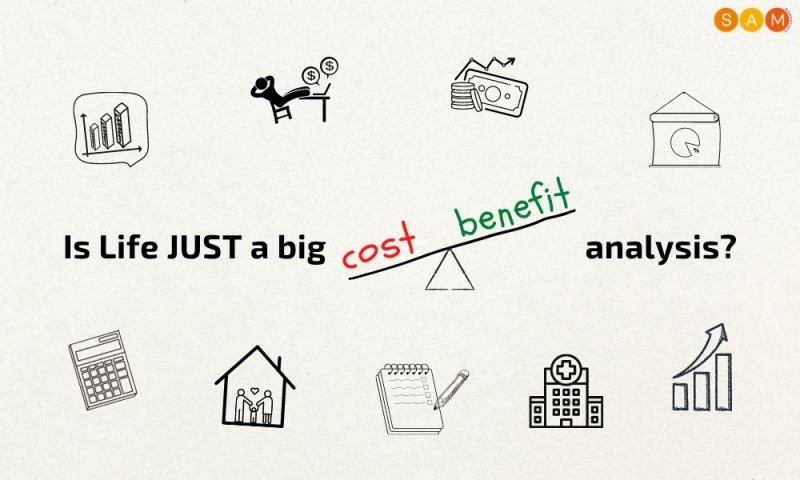Someone rightly said, “If we tie our happiness to our goals, then most of our life will be spent in unhappiness in the pursuit of achieving those goals.”
Doesn’t this quote reflect the irony of life? We all make grand plans for the future, and hustle every day, putting ourselves to strenuous tasks and torments only in the hope of achieving an ever-delighted phase - ‘a happily ever after’. We acknowledge that the world and its workings are based on practicality and infer that ‘a happily ever after' can only be achieved by being pragmatic.
And so, from making career decisions to making relations and choosing a social circle, we take all these decisions based on some form of self-interest or see them as some kind of business investment hoping to get good returns. Although there is nothing wrong with being practical, at times, it obscures our understanding of life and thus, halts our pursuit of happiness.
But isn’t our happiness within the fulfillment of our desires and dreams?
Yes, and no actually.
The Greek philosopher, Aristotle, distinguished between two kinds of happiness - hedonia and eudaimonia. Hedonic happiness is derived from pleasure from materialistic gains: pleasure in doing what reduces physical agitation, pleasure from self-care, fulfilling desires, and feeling a sense of satisfaction. Eudaimonic is associated more with seeking peace and virtues, fulfilling responsibilities, being concerned for the welfare of other people, and living up to personal ideals. Both are complementary and paramount for a joyful life. While the former helps sustain life, the latter gives meaning to it. Without a meaning or a purpose, even the merriest of occasions can feel hollow.
Life is a collection of moments. The revelation about the true nature of life and delight occurs only when we start living these moments, appreciating the little things in our life instead of getting engulfed in its cost-benefit analysis. The little things in our life, from a perfect cup of coffee after a rough day or a cold breeze caressing our face, to any random act of kindness, enlighten us about the subtlety of joyful life.
Happiness has always been inside us; it is our innate nature to be happy. It is the core of our being and it doesn't rely on any material. The external sources only bring out what is already there and aren't a cause of inception. Give a 10 Rs bill to a child and it will make him full of joy, but not an adult. The happiness isn't in the 10 Rs bill, otherwise the adult would also feel happy.
We all have gone through tough times and know that life can be harsh. We need strength and hope and warmth to keep going. The little things in life provide us the support to DO better than yesterday, and to BE better than yesterday. These things help us focus on what is there in our life instead of what is missing. We start to generate our own joy and this shift in mindset propels us to do great things. But how can we enjoy these moments?
The answer lies in our past. Observe how, as children, we were full of life and happy all the time. We used to get excited over small things and laugh with our hearts out. It is almost magical to see kids with so much enthusiasm and positivity.
What happened to us growing up?
Children don’t overthink but get wholly consumed in the moment itself. They are focused, without worrying about the future, and thus, are not under constant mental agitation. That carefree attitude might not be always possible to uphold with all the responsibilities we have today, but even then we can learn from children this art of ‘just being’, can’t we?
As stated earlier, happiness is an innate quality. More so, a state in which our mind’s habitual agitation is calmed. Just like the eye of the storm even being surrounded by all the agitation is unperturbed, similarly, there is a perfect state of bliss and joy at the center of our being.
When a desire is satisfied, or the cause of a fear is removed, the surface agitation of our mind subsides temporarily, and in that temporary calm, our mind enjoys a taste of its own innate happiness before the genesis of any other desire or fear takes place.
The mundane activity of our mind disturbs it from its calm state of ‘just being’ and causes it to lose sight of its own innermost happiness. Therefore, to master the art of being happy, we must master this science of realizing our true Selves - the science of pacifying the mental perturbation, and consciously and constantly ‘being’ in the unagitated state while still supporting the activities at all levels.
It is the mix of material and immaterial pleasures that makes life radiant. While we are well acquainted with the ways to achieve hedonia, eudaimonia is subtle. It can be found in the most mundane activities and even in the most arduous task. The savouring of every moment while practising the state ‘just being’ is the essence of life. This realization when dawned upon, helps in comprehending the subtlety of life and thus, in exercising the right to live life to the fullest. Each moment then becomes an occasion and life becomes a celebration.
So is life just a big cost-benefit analysis?
Not quite.
It is the quest for the art of ‘just being’, the quest for searching our true self.

